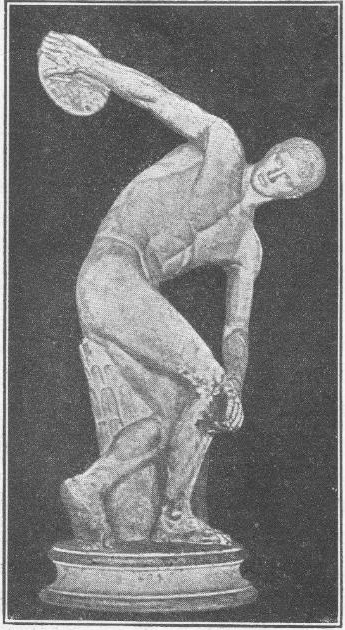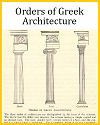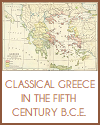| Discobolus of Myron |
|---|
| www.studenthandouts.com ↣ World History ↣ Ancient Greece ↣ Images of Ancient Greece |
Discobolus of Myron: Marble copy of a famous bronze statue made by the Greek sculptor Myron. Discobolus means "discus thrower." Greek athletes, such as those who participated in the ancient Olympics, competed in the nude.
Click here to enlarge this image. The discus was one of the sports in the ancient Greek Olympic Games. It was a track and field event that involved throwing a heavy disc as far as possible.
The discus was one of the sports in the ancient Greek Olympic Games. It was a track and field event that involved throwing a heavy disc as far as possible.
Historical Origins: The discus throw has its roots in ancient Greek culture and was one of the events in the ancient Olympics. The ancient Greeks considered it a test of both strength and skill. Athletic Competition: The discus event was a prestigious athletic competition in the ancient Olympics. It was part of the pentathlon, which also included the long jump, javelin, running, and wrestling. Equipment: In the ancient Olympics, the discus was a solid bronze or stone disc, not the familiar flying saucer-shaped object used in modern track and field. Athletes held the discus in their hand, typically with one hand holding the center and the other steadying the edge. Technique: The technique of the ancient discus throw was quite different from the modern version. Athletes spun in a circle and released the discus while rotating, attempting to throw it as far as possible. The athlete with the longest throw was declared the winner. Symbolism: The discus event, like other ancient Olympic sports, held symbolic significance. It celebrated the Greek values of strength, agility, and competition. It also had a connection to the mythological hero Hercules, known for his great strength. Records and Achievements: Just like in modern sports, athletes in ancient Greece sought to set records and achieve greatness in the discus event. Victors were celebrated for their skill and strength. Olympic Tradition: The discus was a vital part of the ancient Olympic tradition. The Games were not only about athletic competition but also a celebration of Greek culture and the pursuit of excellence. The discus throw, along with other track and field events, showcased the physical prowess and competitive spirit of ancient Greek athletes. While the equipment and techniques may have differed from the modern discus event, its role in the ancient Olympic Games was integral to the celebration of Greek athleticism and the pursuit of excellence. |
 |  |  |  |  |
| Ancient Greece Books and Films | Ancient Greece Outlines and PowerPoints |
| Ancient Greece Maps and Pictures | Ancient Greece Study Games |
| Ancient Greece Miscellany | Ancient Greece Worksheets |
| www.studenthandouts.com ↣ World History ↣ Ancient Greece ↣ Images of Ancient Greece |








